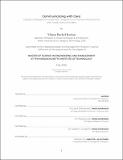| dc.contributor.advisor | D’Ambrosio, Lisa A | |
| dc.contributor.advisor | Lee, Chaiwoo | |
| dc.contributor.advisor | Coughlin, Joseph F. | |
| dc.contributor.author | Kurian, Nihara Rachel | |
| dc.date.accessioned | 2022-08-29T16:22:03Z | |
| dc.date.available | 2022-08-29T16:22:03Z | |
| dc.date.issued | 2022-05 | |
| dc.date.submitted | 2022-06-28T20:31:11.466Z | |
| dc.identifier.uri | https://hdl.handle.net/1721.1/144934 | |
| dc.description.abstract | Today, more than one in five Americans are informal or family caregivers, and these numbers are increasing at an unprecedented rate. Tasked with the burden of advocacy and responsibility of care, these caregivers also navigate the implications of this care on the emotionally charged relationship with their care recipient. Further, otherwise saturated with innovation, the healthcare space seems to neglect these caregivers, with healthcare providers and patients taking precedence. Often playing an integral role in the medical care management of their care recipient, caregivers struggle with short appointment times, leaving with unanswered questions and anxiety about providing care until the next visit.
In partnership with the MIT AgeLab, this thesis utilizes the design research process through remote in-depth interviews to identify and uncover methods used by the caregivers to record and share symptoms and progression with healthcare providers (primary and other associated appointments). The study seeks to understand the most significant challenges they face in interacting with healthcare providers and how it connects and translates to their caregiving approach.
The outcome of this work explores the need for a framework for effective caregiver- healthcare provider communication. By building self-awareness of their evolving needs in their caregiver journey, the study looks to arm them with adapted skills and tools within the limitations of the system. Caregivers can anticipate and help healthcare providers get the whole picture. This would serve in navigating interactions with healthcare providers to go beyond the appointment, building confidence in their caring abilities off the clock / without supervision or official training, lightening the emotional load. | |
| dc.publisher | Massachusetts Institute of Technology | |
| dc.rights | In Copyright - Educational Use Permitted | |
| dc.rights | Copyright retained by author(s) | |
| dc.rights.uri | https://rightsstatements.org/page/InC-EDU/1.0/ | |
| dc.title | Communicating with Care: Design strategies to empower caregivers to improve interactions with healthcare providers | |
| dc.type | Thesis | |
| dc.description.degree | S.M. | |
| dc.contributor.department | System Design and Management Program. | |
| dc.identifier.orcid | https://orcid.org/0000-0002-5744-0424 | |
| mit.thesis.degree | Master | |
| thesis.degree.name | Master of Science in Engineering and Management | |
